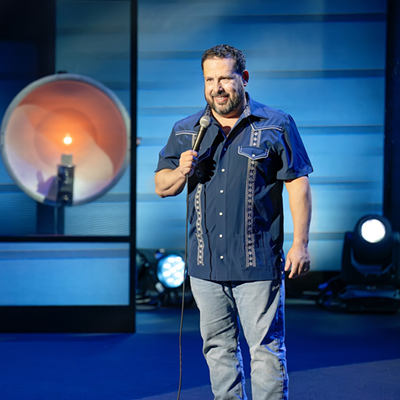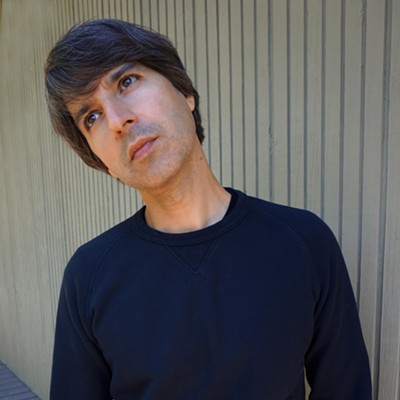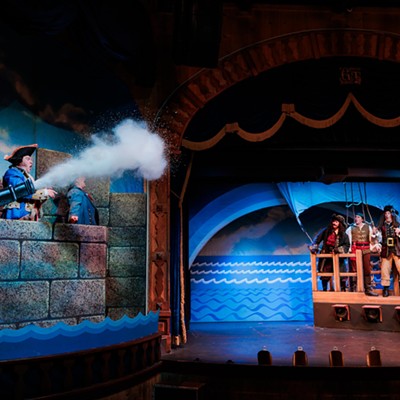There's the popular Tucson Meet Yourself, celebrating Tucson's ethnic communities in one big party. And there are a variety of festivals that celebrate different cultures, including Oktoberfest, La Fiesta de San Agustin, Native American Powwow and the Italian and Greek festivals. Yet another is the Celtic Festival, now in its 19th year.
The Tucson Celtic Festival and Scottish Highland Games take place Friday, Nov. 4 and Saturday, Nov. 5 at Rillito Park Race Track, 4502 N. First Ave. A torchlight clan ceremony begins approximately 7:30 p.m. Friday, and a ceilidh with The Muses follows. Admission for Friday's events is $5 at the gate. Festivities continue on Saturday from 9 a.m. to 5 p.m.; Saturday admission is $12 at the gate or online at tucsoncelticfestival.org. A $2 discount is available for those who bring in canned tuna or peanut butter for the Community Food Bank. Children younger than 13 are free with a paid adult. Call 807-9509 for more information.
The festival is sponsored by the Tucson Celtic Festival Association, whose sole purpose is to put on the festival, which unites "the tribes of the seven Celtic nations." Asherah Caldwell, president of the association, defines the seven nations as Ireland, Scotland, Wales, The Isle of Man, Cornwall, Galicia (in northwestern Spain) and Brittany (on the west coast of France).
"Our gatherings are not exactly how they do it in Ireland or Scotland," says Caldwell. "These gatherings developed in North America when they were displaced here by England (in the mid-1740s). ... England wanted to control Scotland. The Scots were a rowdy bunch with their own way of life. ... The English squashed them (in battle), rounded up people and sent them to America as indentured servants and prisoners of war. ... There was a big influx of Scottish people before the American Revolution. That's when these gatherings became part of our heritage. ... They were an opportunity for families to come together ... and reconnect with their own culture. That tradition has carried on to a whole array of Celtic festivals and Scottish Highland Games that continue today."
On Friday evening, a torchlight clan ceremony gives clans an opportunity to formally present themselves. Caldwell defines a clan as a familial unit. Many are incorporated as official entities.
"Hundreds of years ago in the Highlands of Scotland, there were clan chiefs," explains Caldwell. "A clan chief was the head of the family and landowner. It was a hereditary position. ... They would have gatherings to protect themselves from the marauding neighbors and would call in members of the clan (who) would pledge loyalty to the chief. Our torchlight clan ceremony is a remnant of that. Clans present themselves to the chief of the game, James McBain."
As with any cultural festival, there will be music, dancing, ethnic foods, traditional dress, shopping, raffles and more. Performing musicians include The Muses, Oceans Apart, Round the House, Trim the Velvet and five bagpipe bands.
There will be a dance stage with performers from the Bracken School of Irish Dance, the Tir Conaill Irish Dance Academy, the Scottish Highland Dancers and the Royal Scottish Country Dance Society. Workshops will be offered for those wanting to learn how to move the Celtic way.
Several talks will be held in the education tent. "Dr. Marty Meeks will speak about the migration of the ancient Celts. Liz Warren will talk about Celtic story telling. Eric Landau will (conduct) Bagpipes 101--what is this thing and why does it sound this way. He will have different types of bagpipes and (will) dismantle one to show how it works. ... We will have Diana Gabaldon, New York Times best-selling author. She has a tremendous following from the Outlander series. She has a new release and will be giving a talk and signing books," says Caldwell.
There will be a celebration of William Wallace, one of Scotland's national heroes and leader of the Scottish resistance to free Scotland from English rule at the end of the 13th Century. A plate with his likeness and other historical merchandise will be sold to mark the 700th anniversary of his execution.
Kids will have plenty to enjoy with face painters, jumping castles, a treasure hunt and athletic events.
Athletic events are a large part of the Celtic Festival and are referred to as Scottish Highland Games. These are "big guys and strong women throwing big, heavy things," says Caldwell. "Imagine picking up a 12-foot to 18-foot telephone pole vertically, balancing it and then throwing it so it goes end over end. Think about what it would take to do that." Hurling poles is just one event featured and is called a Caber Toss.
Another event involves picking up a 56-pound weight from a standing position and throwing it 10 to 15 feet up in the air over a bar.
"These are hugely strong athletes," says Caldwell. Award-winning athletes Mike Pokoski and Mindy Lincoln, both victors at the U.S. championships, are scheduled to appear.
The William Wallace Braemar Throw is open to people older than 18. This involves throwing a heavy, round stone from a standing position. Professionals throw stones that are more than 20 pounds. A donation is required for this event, but Caldwell says they will take your picture "so you can prove to your friends that you did this."
Now that may just blow their kilt up.







